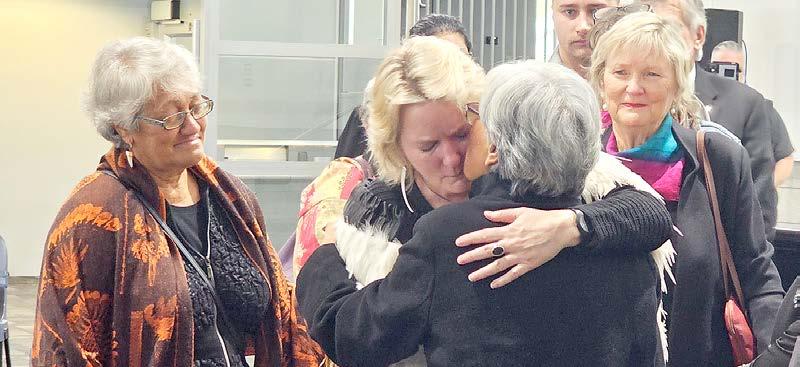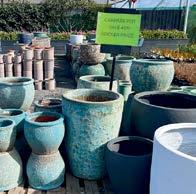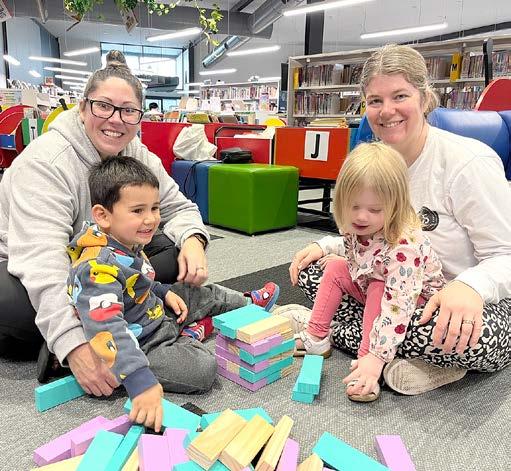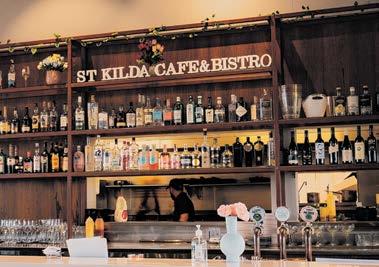







By Mary Anne Gill
Waipā’s new chief executive was greeted with a powhiri at Karāpiro on Monday, and it was down to business the following day with her first council meeting.
Tokoroa born Stephanie O’Sullivan accepted the challenge of a demanding meeting where elected members debated the future of its Māori ward and then had a workshop on the financial strategy of the district’s most demanding Long Term Plan yet.
“I feel like I’ve come home, and it was time to come home,”
O’Sullivan told The News at her powhiri at a venue looking out towards the Waikato River which

has featured prominently in her personal and working career.
More than 250 invited guests heard mayor Susan O’Regan describe the attributes she and other councillors wanted when they began the search to replace long-serving Garry Dyet.
“We wanted a chief executive who was a very confident decision maker but has a preference for collaboration.
“We chose Steph.”
She repeated “We chose Steph” several times as she outlined the other characteristics they sought which included being a servant leader who focuses primarily on the growth and well-being of people in the community to which
they belong.
“We specifically said narcissists need not apply,” said O’Regan.
“That’s because we wanted a leader who can inspire and motivate colleagues who can foster collaboration and empower others.”
O’Sullivan - who is fluent in te reo and spoke in Māori for five minutes, carried a photo of her late whānau dad Hori Deane into the powhiri. She was accompanied by family members including her mother Mary, sister Marnie, stepmother Karen and nephew Daniel La-aiva and supporters from Whakatāne where she had been the district’s chief executive since 2018. Missing
was her father Paul who had a turn and was admitted to Waikato Hospital on the morning of the powhiri.
“He was so gutted. He was so looking forward to being here today.”
O’Sullivan wore huia earrings given to her by the Whakatane executive because the bird was prominent in the Waipā district before its extinction and was a symbol of the wisdom and connection to the land.
She singled out several people for mention including Dyet who had been “an institution” not only for Waipā but for local government.
Continued on page 2





Waipa Māori ward councillor DaleMaree Morgan made an impassioned plea supporting Māori wards ahead of her colleagues’ decision to retain them this week.
The decision will spark a binding poll at next year’s local body elections where voters will vote on whether they want to keep Waipā’s solitary Māori ward. It will not impact on the current representation review which recommends reducing the number of general wards by three to seven.
Morgan was elected 14 months ago in a by-election and appealed to councillors on “more moral and ethical grounds”.
The establishment of Māori wards was a fundamental issue of justice, equity “and our responsibility as elected officials to uphold the principles of Te Tiriti o Waitangi,” she said
“Māori wards provided an opportunity to ensure that Māori, as tangata whenua, have a guaranteed voice in our local governance, reflecting the unique partnership envisioned by Te Tiriti.
“As leaders of our community, we must ask ourselves: what kind of a future are we shaping for Waipā? A future where the voices of Māori are sidelined or a future where we stand together in the spirit of partnership and mutual respect?”
Holding a poll to determine whether Waipā should retain a Māori ward was a democratic option, “but we all know the risks reducing a matter of justice to a popularity contest”.
The decision to support Māori wards should be grounding in our commitment to uphold the rights of Māori as guaranteed under Te Tiriti, not subject to the whims of a majority vote. We have a moral duty to protect these rights, even when it may not be the most convenient or popular path














“He has been a mentor and a friend to me as well as a colleague and I wish to acknowledge him, his achievements and his dedication,” she said.
“I stand today by this beautiful river, humbled by its strength and beauty.”
O’Sullivan – who attended Forest View High School in Tokoroa and graduated from Massey University with a double major in planning and development studies - held numerous governance roles including the Waikato River Authority, Waikato River Trails Trust, Tauranga People’s Project and chaired the Advisory Board for the University of Waikato Adams High Performance Centre in Mount Maunganui.

News/Editorial
Roy Pilott editor@goodlocal.nz
027 450 0115
Mary Anne Gill maryanne@goodlocal.nz
021 705 213
Viv Posselt viv@goodlocal.nz
027 233 7686
Chris Gardner chris@goodlocal.nz
027 231 7007
Advertising Director
Janine Davy janine@goodlocal.nz
027 287 0005
Owner/Publisher
David Mackenzie david@goodlocal.nz
Office/Missed Deliveries
07 827 0005 admin@goodlocal.nz
“You know the saying when life gives you lemons, make lemonade?”
O’Sullivan went on to say she sustained a foot injury in June which resulted in her being on crutches for eight weeks and resting up rather than holidaying during the break in jobs.
She instead watched the Olympics and reflected on the Waipā district – the home of champions and high performance.
“What a joyous, momentous, amazing event and reflection of human endeavour.”
Local government was more of a change event than a pinnacle event like the Olympics, but the emotions were similar, she said.
“Local government is in the business of 24/7 and 365 days a year delivery and it’s all out there for the world to see. Pretty much just like those athletes.”
Her role as chief executive was to make the community proud, to concentrate on performance, learning and leadership.
“And this is what excites me,” she said.
“We must get after those things that are important, continually moving in a direction, aiming higher, doing better.”
Afterwards she told The News the powhiri was a “beautiful and slightly overwhelming occasion.”
O’Sullivan revealed she was living in Cambridge and was a keen cyclist.
Local government was going through enormous changes, she said.
“Communities are different and unique and that’s the wonderful thing about being a leader in local government,” O’Sullivan said when asked what was different between
Whakatāne and Waipā.
“You get to see communities express themselves in place. But I think there are some structural and system issues in local government that will need to change in
years to come. And mayor Susan referred to that and it will be about local government standing up and showing that leadership itself and designing the future for local government.”


This week a counterfeit $50 note was presented at a local business. Where there is one note, there may be more.
The Reserve Bank website provides comprehensive information around key identifying features of legal tender. Some of the initial features to check are as follows: New Zealand bank notes have a clear hologram window which shows the outline of a kōkako, a map of New Zealand and a silver fern when tilted. Counterfeit notes we have previously seen have sellotaped or glued-in attempts at clear plastic inserts which do not show this hologram. The printing on the note itself should be crisp and clear and is water resistant. Counterfeit notes sometimes appear blurred, or ink will otherwise smudge. On legitimate notes, the small bird on the bottom front left corner will have a coloured bar which rolls up and down as you tilt the note back and forth
in the light – this will not be present on a counterfeit note.
Please be sure to check notes as you receive payments in your business - $50 notes appear to be a favourite. If you believe a counterfeit note has been tendered in your business, minimise any handling (use gloves too if possible) and place it immediately in a paper envelope. While it is tempting to hand it around staff for all to see, this can compromise evidence. Let police know as soon as possible and preserve any CCTV evidence of the person who presented it. If the counterfeit note is detected at the time of presentation, call 111 while the person who presented it is still in store.
In the seven days prior to writing, Cambridge Police have dealt with the usual mix of incidents. We had seven burglaries, a stolen vehicle, three reports of theft from vehicles, dealt with eight family harm

incidents, a police safety order breach, a serious assault, three fraud matters, drunk drivers, two bail breaches, three mental health incidents, trespass matters, three traffic crashes, shoplifting, lost and found property and other miscellaneous traffic offences.
A member of the public recently reported youth seen graffitiing at a local park. Their school was contacted, and police are also speaking with them with appropriate action being taken. On Friday and Saturday nights, two drunk drivers were detected at a checkpoint on Victoria street, with the result that one will face a charge in court for breath alcohol exceeding 400mcg alcohol/litre of breath. The second received an infringement for a lower level reading. Have a good week and stay safe.

Dallas Prince, from the Cambridge based Wholly Cow butchery, was a young butcher of the year finalist at the industry’s annual awards last week. Brad Gillespie from Te Awamutu’s Pak’n Save took part in the butcher teams challenge event as part of the Cut Above Butchers who won the best lamb product competition.
Motorists will start using the new Piarere roundabout –the intersection of highways one and 29 – in less than four weeks. But getting there will involve closing SH1 south from Piarere for a day on September 24, when vehicles will detour along highways 29 and 27 - adding about 12 minutes to their journey. The detour will not apply to emergency vehicles or residents and school buses.
Elm trees in in Waipā will be injected with a vaccine designed to improve their resistance to Dutch Elm Disease, which was found in three trees in February. The vaccine, to be imported from Holland by Waipā District Council, will come at a cost of $25,000. DutchTrig has been found to be effective when used annually.
Former Christchurch City Council chief financial officer Carol Bellette –current finance director at AgResearch - will become an independent member of Waipā District Council’s Audit and Risk committee. She is already deputy chair of Hamilton City Council’s Strategic Risk and Assurance committee, which is chaired by Bruce Robertson, who also chairs the Waipā statut2ory committee.
The New Zealand String Quartet will bring its Soundscapes tour to Cambridge Town Hall next month as part of a move to take its music beyond the usual concert hall setting.
By Chris Gardner
A council committee tasked with receiving operational reports from the Maungatautari Ecological Island Trust met once in the two years before the trust’s current cash flow crisis.
Waipā District Council contracts the trust, which operates the $5000 per day world’s largest predator proof enclosure on Mount Maungatautari, to manage Maungatautari Scenic Reserve.
The council has a service agreement with the trust.
The project is partially funded by the Department of Conservation, Waikato Regional Council and Waipā District Council. But he Department of Conservation’s withdrawal of its community fund has left the project in a precarious position and Sanctuary Mountain Maungatautari
chief executive Helen Hughes campaigning for funds.
Hughes, whose title changes from general manager to chief executive this month, went public with the trust’s cash flow crisis in June - six weeks after the Maungatautari Reserve Committee’s first meeting in two years.
In the two years since the committee had previously met in February 2022 it had lost its chair, councillor Elwyn Andree-Wiltens, after which the then mayor Jim Mylchreest was confirmed as her replacement, never chaired a meeting. He was trust chief executive from 2002-2009.
“That reserve committee did not have oversight of money,” he told The News.
And cash flow had been a problem since the project began 20 years ago.
“It’s a real challenge,” Mylchreest said. “Effectively Maungatautari lives from hand to mouth.”
He believes the project is undervalued and called for a costbenefit analysis and a fresh look at how it is funded.
By the time the committee met this year Mylchreest was no longer mayor and had been replaced as chair by Maungatautari ward councillor Mike Montgomerie.
Montgomerie was unaware of the lag between meetings, when The News spoke to him in May.
Hughes said the reserve committee received operational reports. Financial reporting was quarterly to the council’s finance committee whose members discussed them in public excluded sessions.
DOC’s seat on the committee was vacant on May 1, 2024, having been
filled at the previous February 16, 2022, meeting by district operations manager Ray Scrimgeour. Scrimgeour has since been replaced by Jane Wheeler who did not attend the last meeting.
Council Customer and Community Services group manager Sally Sheedy said in a statement that the committee met when needed and was just one mechanism by which the trust reported to the council. The trust regularly reports to the council’s Finance and Corporate committee on its financial position.
“There is no set meeting rotation, and its work focuses on overseeing matters that relate to the oversight of the reserve itself and the enclosures,” she said.
The date of the next committee meeting will be set when the trust has drafted its annual work plan.
Sanctuary Mountain Maungatautari volunteers have taken to the streets to raise awareness of the project’s cash flow crisis after seven rangers lost their jobs.
Guided by volunteer co-ordinator Lian Buckett, they are collecting cash, encouraging regular financial support, and offering 10 per cent discount vouchers to visitors.
They collected cash at Chartwell Shopping Mall on August 19, the Te Awamutu branch of The Warehouse on Friday, Te Awamutu Library on Saturday, and plan to collect at Cambridge Library on Saturday.
“We have got a cold call situation, it’s quite a hard sell in current times,” Buckett said. “Some people just walk by, others say they have heard about it, one person at Chartwell donated $300.”
Sanctuary Mountain Maungatautari operations manager Dan Howie spoke of how his job has become
really difficult since the project lost more than half of its 13 mountain rangers as the Department of Conservation’s Jobs For Nature funding dried up.
“It’s been hard on the team,” said Howie who has worked on the mountain for almost six years.
“The reduction in staff has made life more difficult. The work on the maunga does not stop.”
Rangers are tasked with a daily schedule of checking rat traps, tracking tunnels and bait stations every 50 metres within a designated section of the grid.
“This work has to continue,” he said. “But it means some of the other good work we can no longer do.”
“Good work” includes trapping predators outside the predator proof fence before they can get in.
Meanwhile the project has received a grant of up to $78,000 from the Rodmor Trust to cover insurance. It will receive $30,000 this year and a further $24,000 in 2025 and 2026.


We believe that each funeral service should be as unique as the life you are celebrating. When a funeral is personalised, it creates a special space for sharing precious memories, telling stories, and simply being together with friends and family.
Rosetown Funeral Home are dedicated to providing personalised and meaningful funeral services, and are happy to discuss new ideas, pre-planning and/or pre-paying for your funeral. We are here for you in your time of need, so please get in touch anytime to discuss your options.

Currently, we have the opportunity to provide feedback to the council by completing submissions on the Representation Review, which closes at 5pm on September 5 and the Local Alcohol Policy and bylaws, closing at 5pm on September 12.
The Community Board will finalise its thoughts on both submissions at our meeting this week.
We are generally comfortable with the outcomes of the Alcohol Policy and Bylaws.
Our involvement from the start, including workshops and an initial submission, has allowed us to contribute meaningfully to the process.
Key changes we influenced include prohibiting off-licenses next to sensitive sites like schools, kindergartens, and churches, limiting the number of outlets in our towns, and empowering the licensing committee to make quality decisions based on evidence.
The Representation Review is necessary







By Ange Holt, Chair, Te Awamutu Community Board
because councillors are questioning whether they can govern better with three fewer councillors.
As a Community Board, we expect a robust discussion on this topic. Here are some questions we will consider before making our submission:
Representation: Will we be well represented with three fewer councillors? Are we ensuring necessary diversity at the council table?
Pirongia, is likely to have both councillors from our side of the district.
Rationale: Have we been provided with any sound rationale outlining the benefits of having three fewer councillors for the community?








Workload: How will this impact the workload when councillors already consider their role a full-time job, especially with increased “red tape” from central government?
Committees: How will three fewer councillors affect council committees in terms of workload, quorums, and attendance?
While councillors will be paid slightly more, and decision-making may speed up, is this change beneficial to the community as a whole or just the councillors?
Change can be good, especially when there are clear benefits. However, we need to be cautious and think this through carefully, as our submissions could significantly change how Waipa is represented at the council.




















































Will councillors need to be on every committee, or will other representatives be co-opted?
To provide some background, most councillors currently contribute over 30 hours per week.


Elections: What impact will this have on getting new councillors elected?
Financial Impact: Will the funds saved from paying three fewer councillors attract a professional calibre of candidates?
Based on current figures that I have seen, councillors are paid slightly less than the minimum wage for 40 hours, which is likely the time needed to do a thorough job.













Ward Impact: This reduction impacts wards significantly, with the rural ward becoming one instead of two.
The west side of the district, including
They handle huge agendas, reading, researching, and speaking to various people to ensure the best outcomes.
For example, our next agenda has over 500 pages, and councillors recently received an agenda document exceeding 800 pages. They have multiple agendas over a month. They do a huge job for us, one where most people have no idea what time and effort goes into this demanding and often highly criticised role.
Please take the time to complete a submission, as your opinion is important. Let’s ensure our community is wellrepresented and our voices are heard.































































By Chris Gardner
Kaumatua Tom Roa
blessed the opening of Hospice Waikato’s new retail store in Te Awamutu so that those at the end of their life could also be blessed. Roa, an ahonuku/ associate professor in the University of Waikato’s Faculty of Māori and Indigenous Studies – and columnist in The News - was joined at Monday’s opening by Hospice Waikato’s acting chief executive Susan Hassall, regional retail manager Tersa Bidlake, and invited guests

at the old ITM building on the corner of Te Rahu and Cambridge roads in Te Awamutu.
Hassall revelled in the opportunity for members of the Hospice Waikato board, staff, volunteers, and wider members of the community to celebrate the blessing of the new store and share in morning tea.
“It’s very special to be able to break bread together and share a cup of tea,” she said. When the opportunity came up to move to the new 580 square metres store from the old 300 square metre store in George Street came
up a decision needed to be made, Bidlake said.
“Do we go big or go home? We decided to go big.”
Last year Hospice Waikato’s retail stores raised $5 million to help those in end-of-life care.
“With this shop it’s going to be $6 million,” she predicted.
Hospice Waikato opened a shop in Sloane Street, Te Awamutu in 1995. The shop moved to 170 George Street in 2009 and to its previous location at 104 George Street opposite The Warehouse in 2015.




By Tom Roa, Tikanga Advisor, Waikato University
I was privileged to offer a Tikanga Māori blessing for the opening of the new hospice shop on the corner of Te Rahu and Cambridge Roads.
I explained to those gathered that the karakia I would recite were ancient, preEuropean, and that they are recited at such events as that opening principally to acknowledge that we are merely human, that there are unseen higher powers than us, and that we use such karakia, with the help of those higher powers, to assert a clearing of a pathway in our environs for us as mere human beings to conduct our business safely, with integrity, unencumbered by anything untoward that might prevent or obstruct our endeavours which in the Hospice case are full of good and honest intention.
I also shared with those gathered a history of that very space according to my mana whenua, Ngāti Apakura background.
Close by on the banks of the Mangaohoi Stream in the early eighteen hundreds stood Kaipaki Pā.
A battle for those lands was waged there between Ngāti Apakura against Ngāti Hauā and Ngāti Koroki-Kahukra. Following that battle peace was made between the Ariki of Ngāti Apakura, Te Wherowhero, and of Ngāti Hauā, Tarapīpipi Te Waharoa, also known as Wiremu Tamehana, with the wedding of Tarapīpipi’s daughter to Te Wherewhero’s grandson.
This peace-making was critical to the acceptance by Te Wherowhero of Tarapīpipi’s offer to support the call of rangatira throughout Maoridom for Te Wherowhero to be Māori King.
Later at Ngāruawāhia, Tarapīpipi placed

the Māori Bible on Te Wherowhero’s head, installing him as the first Māori King. The notion of a Māori King was borne from more than 20 years of consultation amongst the rangatira of Māoridom who searched for one amongst them who would be equal in status to Queen Victoria, and as such be able to speak on their behalf, a King to a Queen. The call was for him to hold fast to the land, to stop intertribal fighting, to maintain mana Māori Motuhake, Māori autonomy, and to unite the people.
Last week Maoridom celebrated Te Koroneihana, the Coronation, of Kiingi Tuheitia Pootatau Te Wherowhero VII, his 18th year as Māori King. On August 21 2006, as the descendant of Kiingi Pootatau Te Wherowhero, he too was crowned by the descendant of Tarapīpipi,, Anaru Tamehana, with the very bible used to install Te Wherowhero as Māori King.
Kiingi Tuheitia has called for us to unite, a call that has resounded amongst Māori and other-than-Māori, a call which attracted tens of thousands to various gatherings throughout Aotearoa-New Zealand, in particular last week at Ngāruawāhia.
The celebration of the opening of the Hospice Shop using Tikanga Māori in concert with Western Protocols is symbolic of the promise in Te Tiriti o Waitangi, The Treaty of Waitangi, where the potential in our working together can realise the aspirations of all those who come into spaces like the Hospice Shop with integrity, honest intent, and a notion of service. Paimārire (goodness through Peace).
Get a green light on your sexual health! Book to see our specialised women’s health nurses, for any of the following and more. Appointments are 30 minutes long, available until 5.30pm.
You do not need to be a registered patient with us to attend this clinic. Many services are subsidised, so the cost is reduced for most patients.
Contraception:
• Emergency
• Long acting reversible IUDs, jadelles
• Depo injection
• Pills, condoms
Pregnancy testing
Early pregnancy assessment
STI checks for all genders



‘Well woman’ checks - comprehensive check-up and screening service to optimise women’s health Abortion care and support

Supporters of the Cancer Society’s annual appeal this year, may well have bought a daffodil from Waikeria Prison.
Around 200 bulbs were planted and harvested by prisoners, which were then donated to the street appeal, allowing the community to purchase bunches of flowers.
“Just like all of us, most of the men in prison know somebody affected by cancer, so this is about being able to give something back, and it creates meaningful engagement for a positive cause,” said horticulture instructor Morgan Quay.
Waikeria Prison has one of the only horticulture-based remand units in the country.
As soon as men come into prison, they can begin learning work skills.
“They are being trained in an



industry, having exposure to the daily structure of work, and are engaged in meaningful work. This breaks down barriers when they come out and supports their reintegration back into the community,’ says Quay.
Daffodil Day is just one of the ways the horticulture unit connects to the local community. Prisoners are growing vegetable seedlings to be donated to the Te Awamutu Food Forest and provide native plants to the Department of Conservation.
“It’s therapeutic work. The men are learning, and they’re engaged in nature,” says volunteer coordinator Nadine Lancaster.
“Connecting the men with the community helps them engage in a pro-social way, and it can be an important step towards making positive change.”




Grey Power Te Awamutu has organised meeting with two district councillors to discuss the needs of seniors in the Waipā district. President Michael Cullen will host Lou Brown and Roger Gordon at the September 5 meeting at the Te Awamutu Sports Club.
Consultation on the Local Alcohol Policy, Alcohol Control Bylaw and Alcohol Fees Bylaw has opened. The policy sets out where, when and how alcohol can be sold, supplied, or consumed concerning these sites. Waipā council is also introducing a bylaw to set the alcohol licence fees for applications and renewals. Feedback closes September 12.
Tirau wins
Tirau Community Board secured the Enhancing Communities Award at the Local Government New Zealand Community Boards awards last week for transforming a largely unused reserve into a beautiful community asset, complete with suspension bridge, pump track, BBQ area, restrooms, and on- and off-lead dog areas.
By Sam Pullenger, Ministry Assistant, St John’s Anglican Parish
When my wife and I got married, we moved to Tauranga for a few years. Living in Welcome Bay, I would often drop my wife off to work and then head into the city to study. If I timed the drive correctly, I could get into the city in 30 minutes, however, if I timed it wrong the wait times could be up to 45 minutes to get where I wanted to go. It is frustrating waiting in traffic slowly creeping forward, knowing that your destination is only a few kilometres up the road.
Review for us to speak into.
Representation is an interesting word, because for much of history the idea of representation meant those in power. Only the perspectives of those who held power deserved representation. However, as society has moved on, we now recognise, in democratic countries, that representation means it is important to hear the perspectives of all peoples who have a stake in what is happening. Why are we looking for representation from all peoples though?

need.” Although, in terms of wealth management, this is not a very wise choice, profound generosity of ordinary people is what enabled this first Christian society to flourish. At the moment we are also being consulted over Waipa’s alcohol policy and bylaws. Again, this consultation is important in the context of asking, what is best for all people?



Living in Te Awamutu now, if I leave at the right time in the morning, I can get to work in under three minutes. And yet, when I find that I have to sit at an intersection for more than 30 seconds, it feels like I am “stuck in traffic”. Perspective is a wonderful thing. Although it is easy to get some perspective on what “stuck in traffic” means, it is not always as easy to get perspective on what is best for our community.
As the people of Te Awamutu we, currently, have the opportunity to think about how our council functions as they have opened up a Representation





Our hyper-individualistic culture, characterised by the introduction of the word “selfie” into the dictionary, drives us to think only of ourselves and what I need or want.
A society does not, cannot, flourish in a culture that drives us towards selfishness. Societies are enabled to flourish by their ability to seek the best for all peoples. The first church, started by Jesus’ followers, has become well known for their care for others.
An often-cited statement about them is, “They sold their property and possessions to give to anyone who had


When I look at these two projects I look from the perspective of an urban, married, young adult who has not, personally, dealt with the effects of excessive drinking in my own life. My perspective is, then, not going to be the same as someone who lives rurally or as someone whose family has been profoundly affected by alcohol abuse. As we respond to these two projects, it is important that we recognise that the best for all people is not always the best for me.
The more we can open ourselves up to diversity of perspective, the more our town will be able to come together to discern which is the best direction.





By Mary Anne Gill
Fire and Emergency have become noticeably more involved in the vetting process for new liquor licences in Waipā.
In his annual report to the Alcohol Regulatory and Licensing Authority, Compliance manager Karl Tutty said the total number of all applications for the financial year ended June 30 was a record 462 - the highest since the act came into force in 2012 – and 50 up on last year.
“Waipā continues to grow, and more hospitality operations are expected. This also reflects the focus on quicker processing and competing more of the older applications,” he told Waipā district councillors this week.
Having a dedicated police contact – in addition to the extra Fire and Emergency scrutiny – had increased collaboration between the agencies and helped the committee and inspectors’ work.
But poor or incomplete applications challenged the Waipā Licensing Authority which granted nine new on licences, six new off licences, 114 new manager’s certificates and 57 liquor licence renewals.
Training records and manager rosters are often
overlooked, and the committee now issues formal directions requesting the information, said Tutty.
The authority refused one renewal – for the troubled Five Stags in Pirongia.
“The recent refusal… was a clear signal to licensees that there was no automatic right to renewal and that suitability remains a key focus.”
Waipa had 76 on licences, 38 off licences and 28 club licences and 475 manager certificates on June 30.
Hearings are now advertised publicly in part a response to ongoing requests from The News but also to pre-empt expected changes to the Community Participation amendments. There were more requests from social and support organisations to view applications than in past years, he said.
These agencies often considered labour and employment and conditions of visa issues including licensees underpaying staff
or taking advantage of migrant workers.
For the third year running Tutty urged the government to review the act -which is now 12 years old – and asked for a definition of intoxication in the act.
An arrangement where the Alcohol Regulatory and Licensing Authority previously circulated significant decisions seemed to have stopped.
“The District Licensing Committee and staff rely on media and other means to
become aware of decisions, including those in other jurisdictions such as the Supreme Court.”
Tegan McIntyre now chairs the Waipā licensing committee with previous chair Sara Grayson helping as required.
Its purpose is to consider and determine applications for licences, manager’s certificates, renewal of licenses and manager’s certificates, temporary authorities and other matters pursuant to section 187 of the

By Chris Gardner
The operator of Pirongia’s Five Stags Restaurant and Bar (pictured right) has closed the business after it lost its appeal against Waipā District Licencing Committee’s decision not to renew its on-licence.
The doors have been shut for about two weeks and Nora Fu, sole shareholder of operator Night Pearl Ltd, could not give a date for reopening.
After the failure to get her licence to sell alcohol renewed, she had been operating the restaurant side of the business under reduced hours.
Fu’s appeal to Alcohol Regulatory and Licencing Authority in June failed after it heard the Five Stags continued to serve alcohol on parts of the premises not covered by the licence between hearing dates, the bar served alcohol to an underage drinker during a police-led controlled purchase operation in November 2023, and Fu failed to properly
appoint and notify a duty manager.
All of this occurred after the Employment Relations Authority ordered the company to pay more than $21,000 following the unjustified dismissal of an employee.
Pirongia Four Square owner Chris McDonnell was disappointed with the closure as he wants everyone in Pirongia do well.
“Nobody knows what’s going on,” said The Hive owner Shereen Parker.
“All the people I have spoken to just can’t believe that’s happened. It’s such a loss to the community. They just want someone else to take it over and run it.”
Waipā Pirongia-Kakepuku Ward councillor Bruce Thomas was surprised with the closure as Fu had promised to get things right.
“I don’t think the locals are happy with not having a place to go and have a drink. It’s quite disappointing.”






















“Send him down to the Shed” is the theme for this year’s Menz Shed week being held throughout New Zealand in early September. Activities are being organised by sheds in the Waikato to promote the week.
Men of the newly revived Cambridge Menz Shed are busy renovating the recently acquired old Leamington dairy factory.
Myles Prebble, spokesman for the shed, says it is “all go” at present.
Men are cleaning out the inside of the building, and the outside is being prepared for painting. Once cleaned and machinery installed, the shed will be ready for business.
Prebble encourages all Cambrigde seniors to get out of their armchairs and call by the shed.
“It is just a great place to be, yarning with old mates and making new ones,” he said.
Following on from their successful Men’s Health Expo, the Te Awamutu Community Menz Shed is embracing the week with a presentation by Sanders Pharmacy about gout.
Historically an “old man’s” problem, it has become relevant in today’s fast-moving world, Te Awamutu chairman Richard Cato said.
“Getting older men to speak about and seek help is a continuing problem for health professionals. When they are within their own company, they tend to open up more about their situation.
“Loneliness is one of the biggest killers of men, especially when they finish work. The shed offers men a sense of purpose, a safe, caring, and supporting environment,” he said.
A quote from their recently
A monthly gardening column, courtesy of Amber Garden Centre
Spring is nearly here and now is the perfect time to reset the garden. Start attacking those weed's and clean up garden beds. If you planted cover crops get them turned over so they can break down. Add compost and generous amounts of sheep pellets to get them well prepped for spring planting. If the garden is ready, get a new run of brassicas in and start planting peas, lettuces and other salad crops so you are ready for the BBQ season. Focus on getting trees, shrubs and perennials planted so they establish their roots before the heat hits. Also, if you are wanting new potatoes for Christmas, start sprouting them now for planting by mid September, to ensure they will be ready for the table. Happy gardening!

T’s & C’s
published “Sheddies” book summed up what happens to men who become armchair-bound and stay home.
“I have found the comradeship and fellowship at the Menz Shed most rewarding. It stimulates the mental well-being of fellows, and I have enjoyed teaching others the skills I have learned over the years. I tried to get my brother-in-law to join but he turned me down and just ‘cabbaged away’. I am still going strong and enjoying it at 89, doing what I love doing, working with wood,” says long time shed member, Ian Stratford.
The key message, Ian says, is “send them down to the shed”, where they will meet new mates, learn new skills, and most of all drink cups of tea.
Helping the community is a big part of the shed’s ethos, says Cato.

“Couples who downsizing their homes, or where a partner has died, often do not have a place to store excess tools or other equipment and often they generously donate it to their local Menz Shed. Such donations are very welcome and are either added to the equipment used in the sheds or are recycled through garage sales.”
The Te Awamutu Menz Shed will also hold a garage sale at Raeburn Street shed on September 7.
Waipā and Ōtorohanga district councils have acknowledged a report released by the Waikato Mayoral Forum which says the region would be better off if local councils worked together to deliver water services.
Waipā councillors this week directed staff to investigate two options - one which would see new chief executive Steph O'Sullivan negotiate a nonbinding agreement for Waipā to join a regional waters organisation and a second, with an assessment due late next month, to determine if council determine can go it alone.
The independent report from the forum said a regional waters entity could save $338 million across the region with most savings driven by improved capital works and planning.
By Meghan Hawkes
When Walter James, a Te Rore farmer, arrived on horseback at William Chester’s he was saddling his horse. It was seven on a March morning in 1880 and the two men intended to go together to Ōhaupō to fetch cattle. William tried to mount his horse, but it was restive, and he had some difficulty. He asked Walter to hold the bridle while he tried again, but William first supplemented the bridle with a rope as he thought the bridle somewhat weak. “Be careful,” said William, “it will act as a curb”. Walter replied, “It will be right enough; I will not pull it too tight”.
As soon as William was up Walter let go of the bridle. But the horse was still agitated, and William struggled with it for about five minutes. Suddenly the horse reared up, and fell backwards, William coming down underneath it. Walter dismounted, and ran to William who was insensible, but quickly became conscious.
Isaac Hodgson, a Te Rore West farmer, who also planned to accompany William to Ōhaupō then arrived. He saw William lying on the
ground, with a pillow under his head and a blanket over him complaining that his chest was very sore. Walter and Isaac helped William into his house. It took until 11am for a telegram to reach Dr Blunden stating that Mr Chester had been hurt by a horse falling on him, and nearly killing him. When he saw William in the afternoon, he found him perfectly conscious but complaining of great chest and abdominal pain. The doctor heated him – the use of warmth as a treatment being common at the time. When he left, the doctor gave directions for Mary Chester to send for him if any change took place in her husband.
Dr Blunden received no news of William’s condition from the time he left until two days later when the coroner showed him a telegram from Constable McLeod announcing that William had died.
At the inquest the doctor said that from the symptoms which Williams’s widow detailed to him, he believed that he had died from internal haemorrhage. The jury returned a verdict in accordance with the evidence. The funeral took place straight after the inquest, the coroner
having given his warrant to bury as soon as the jury had viewed the body.

William was greatly respected and about 250 settlers followed the coffin to the Pirongia cemetery on horseback. Many of them started from Te Rore, and very many more joined procession. It was the largest funeral seen in the district. William left Mary with six young children. For some time he had been the agent for the Waikato Steam Navigation and Coal mining company and the year before he had leased the operation of the Te Rore ferry. After his death Mary gamely took on the agency but a few months after William’s death she was relieved of the duty of attending the Te Rore ferry by the Waipā council. She was perhaps overwhelmed by the situation she was in after the accident which so suddenly took her husband.















By Viv Posselt
One hundred and fifty years of Te Awamatu Library history, of stories told and minds expanded, were celebrated at the facility last week.
The Te Awamutu Library Sesquicentennial kicked off last Friday night with a wine and cheese evening for staff and invited guests; Saturday opened up to the public with a feast of children’s games, some of which dated back several generations, and a celebratory cake cutting.
Before slicing into the 150th birthday cake, Waipā deputy mayor Liz Stolwyk told those present the library had been through a number of changes through the years before settling in its present position and becoming a much-used ‘gateway for our community’.
Records show the library has had a chequered past – details of which can be
By Chris Gardner
The late Sally Uerata’s contribution to the Pirongia Heritage and Information Centre was recognised with a posthumous presentation to her whānau.
Uerata, who died on December 6 last year, was a foundation member of the centre committee with Lady Raiha Mahuta in 2000.
With Mahuta, Uerata negotiated the naming of Rangimarie Reserve on which the centre stands in Franklin Street.


seen on a time-line board with photographs up in the library. In a nutshell, it chronicles the story from the time it was established in 1874 with 17 subscribers out of a village of just 43 people. It went through theft, periods of popularity and decline, numerous shifts into different buildings around town, floods, leaks and serious overcrowding of books when it almost burst at the seams. The years were filled with promises to secure a new library for the town.
The library moved into its present architect-designed building on the Mahoe St/Selwyn Lane corner in 2016. As of August 1 this year, it had 17,753 registered card holders and the collection (excluding eResources) contains 79,444 items.
Sheree Gross was library supervisor until 2023 – Donna Wilson is the current library supervisor. Gross played a part in the 150th celebrations by baking the birthday cake.
Uerata grew up in Robertson Rd, Ngutunui and attended Pirongia School. She received knowledge of many sites of significance to Māori in and around Pirongia from her mother Kate McOnie.
She also campaigned for the old Pirongia School building to be moved and preserved, making flax kono baskets to sell in aid of the project.
She was also involved in getting Matakitaki Reserve recognised as a special reserve, and involved in the development Te Ngahere Reserve
A life membership was presented to Uerata’s daughter Melissa Campbell, her brother Murray Uerata, and his three daughters Mihi, Ara and Maia.


































































































By Janine Krippner
Since Whakaari is reminding us that we live with active volcanoes, it’s a good time for a reminder about what volcanic ash is, and what it isn’t. I haven’t yet seen any cringey headlines claiming that it is “spewing smoke” or “toxic ash”, but these are common when volcanic activity hits the news so let’s go over them.
Volcanic ash is generally magma that is blown apart (fragmented) by rapidly expanding gases within it. External water like lakes, the sea, or underground reservoirs/groundwater may add to this as the water flashes to steam, expanding rapidly and potentially adding to the explosive power of an eruption.
Ash is volcanic rock 2mm or less in size. When it’s 2 to 64mm in size, it’s lapilli, bigger than that are blocks (solid) or bombs (fluid). Together, this is called tephra.
It doesn’t have to be magma though. Rising gases, including steam from vigorous geothermal activity, can fragment the rock around it to produce ash. Older ash from past activity can be also incorporated. This is still pulverised rock, but it doesn’t need to be fresh magma. We can tell the difference looking at the ash under a microscope.
A plume coming out of the volcano is definitely not smoke, that’s a red flag warning that someone doesn’t know what they are talking about. The material is different, and importantly, the impacts are different. Whether it be an ash plume or gas emissions (including steam), calling it smoke is just plain wrong.
Steam is a large component of gas plumes. Gas, or gas-and-steam plumes, appear white. Once ash (fresh magma or not) is
incorporated into it we get the light to dark grey colouring. Generally, the darker the grey, the higher the ash content (cloud cover or light conditions can also make plumes appear grey).

When it comes to “toxic ash” headlines, they are often also wrong. Ash itself is not toxic, it’s just small bits of rock. Depending on the gases, it may have a coating of something like fluorine that can be toxic depending on the concentration. Testing must be done to confirm this. If a headline is claiming ash is toxic straight away, chances are they are making that up, it’s another red flag.
There is a lot of misunderstanding about what happens when you inhale volcanic ash. It won’t shred your lungs, even though it is sharp and abrasive. If it is getting into your lungs, it must be small enough. This can cause issues, especially if you have conditions like asthma or chronic obstructive pulmonary disease, so a mask should be worn if you find yourself in an affected area.
What areas are impacted depends on how much ash or gas, how high it is reaching, and the wind strength and direction. Ash and gas plumes get blown by the wind, so this is when working with meteorologists becomes an important part of volcano monitoring. Eruptions are an important and healthy part of the natural processes on Earth, so when they are in the headlines, I hope this helps you to spot red flags that inevitably pop up. As always, follow GNS Science/ GeoNet for updates.
By Peter Nicholl
I was going to write this column about the Commerce Commission’s recent report on competition in our banking system – and I will do that in my next column. But there is something I experienced in Wellington two weeks ago that has been bugging me and if I don’t write about it know it will be too late.
On August 10 my two children who live in Wellington gave me a late 80th birthday present – we went to see the All Blacks play Argentina at Sky Stadum. It was a lovely thought, and as they say with presents it is the thought that counts.
But the actual event was a disappointment –for three reasons. The first two reasons any of you who watched the game will already know. The All Blacks lost, and they made many basic mistakes that not even the Hautapu club side would make.
The third reason was the whole atmosphere of the event. A high-level sports event is like the theatre – the atmosphere has to be appropriate for the type of performance we are watching: musical, comedy and drama for example.
A rugby test match featuring the All Blacks should be a drama – and this match developed all the elements of a nail-biting drama: a close score, the lead changing, an outcome in doubt. But the atmosphere that the rugby union created in Sky Stadum had no sense of drama at all – it was that of a musical comedy. Every time there was the slightest break in the game, loud pop music was blared over the speakers and people in the crowd would sing and get up and dance. The music and the dancers didn’t always stop as soon as the game restarted.
The rugby union would probably say they are getting the crowd involved. The recent Paris Olympics showed what getting the
A $40 million injection to the Waipā economy was announced on Thursday morning, and hopefully I was not the only dairy farmer celebrating. To my wife’s amazement, I took my family out for a curry at a local restaurant.
Fonterra’s 50c per kilogram milk solids lift in forecast payout for this season is the cause for our joy. Around 80 million kilograms of milksolids are being produced in Waipā. With what can so far be described as a near perfect 12 months of weather, this spring’s grass growth is ahead of target, cows are in


better body condition, and farmers are ahead on production. On our farm we are 29 per cent ahead for this time of year. Our cows are one month away from their normal peak milk production, however we are already doing more milk than normal peak. Farmers have been able to reduce use of stored silage, which instead they will be able to use during the dry of summer. All in all, worth writing about. Interest rates, inflation and labour market tightness have been simultaneous challenges for all industries. It has been a nervous wait where we have just had to keep check on

By Andrew Myles
spending and the budget. While this is not over, it is good to see some sunshine coming through the clouds.
Fonterra is controlled and owned by New Zealand families who work hard every day to supply the best possible milk to our customers. We couldn’t do this without the local businesses who support us and help us along the way. All the returns made by Fonterra farmers flow back into the local economy and the rural communities. We hope this also brings a bit of support to local family businesses in town.
For other dairy farmers, there is some not

crowd involved really means. The crowds there were ‘involved’ totally in the actions that were happening before them in the stadiums. You could see this when an athlete signalled the crowd in the athletics stadium for silence – 70,000 people were instantly silent.
The musical interventions at Sky Stadium did not get the crowd involved in what was happening on the field. They were a total distraction from that. They were a different event entirely.
For some people at Sky Stadium, the music seemed to be the most important event. They sang and danced happily as the All Blacks were being beaten. I am not sure if some of them realised what was actually happening in the ‘drama’ unfolding on the field.
I have in the last 15 years watched test rugby matches in England, France and Italy. I also watched a test rugby match in Sarajevo between Bosnia and Luxemburg but that doesn’t really count as there were only about 200 spectators and Hautapu would have comfortably beaten both sides.
Nothing like what happened at Wellington recently happened at these test matches in London, Paris and Milan. They were put on as ‘dramas’ not as ‘musicals’.
The NZ Rugby Union seems to totally lose sight of the product they are supposed to be marketing. I don’t know what it is like for the players to play in such a distracting atmosphere.
The weather was fine, but the stadium was far from full. As a marketing strategy it can’t be judged a success either.

so good news. Local Synlait suppliers face uncertainty about the future of who will be picking up their milk next week. Here’s hoping it all goes smoothly for them. Overall, the pay increase is something to cheer about this week, before we batten down for the rest of what spring can throw at us. Bring it on!
• Andrew Myers, a dairy farmer from Roto-o-rangi, is the Fonterra Co-operative Councillor for the Waipā ward.


























August 29, 2024
The results of the latest Annual Resident Perception Survey are in, and Waipā District Council is doing better in the eyes of the community.
Our ‘back-to-basics’ approach in spending and decision making has led to satisfaction with the council’s overall performance rising three percentage points since last year.
Mayor Susan O’Regan says it’s an encouraging sign during tough times for everybody.
“It’s early days, but this gradual improvement shows that Waipā residents are increasingly trusting the council and appreciating its efforts,” she said. “The survey results show we are on the right track and highlights where we need to improve.”
People happy with the council’s services, facilities and infrastructure increased four percentage points year-on-year, and nearly one in seven praised the council for doing a good job, with friendly and helpful staff.
Waipā pride remains strong, with community spirit increasing and 66 per cent of residents rating their quality of life as ‘good’ to ‘excellent’.
Benchmark results against other councils will be available in mid-September and will reveal wider trends across local government.

Waipā’s elm trees to be vaccinated against deadly disease
Roll out of a vaccination for elm trees in Waipā will help protect them against Dutch Elm Disease.
The fatal and fast spreading tree disease was discovered in the district in February. It is caused by a species of fungus and is almost always deadly.
The vaccine will be administered in November on Council parks, reserves and street trees and will extend to privately owned protected trees.
Arborist planner James Richardson said the vaccination would not harm the trees.
“It increases the trees’ natural defence mechanism and greatly reduces the chances of them dying if they get the disease,” he said.
Waipā is following in the footsteps of Auckland Council who have seen a decrease of trees dying from the disease over the past three years since the vaccine was introduced.
“We have only had three reported cases of the disease, but we want to be proactive in slowing the spread.”
The vaccine is manufactured in the Netherlands. It is currently not available to the public. The vaccination programme is estimated to cost $25,000.
We have a range of events planned to celebrate sustainable fashion this month. Get involved and get inspired.

8.00 - 9.00pm, Tuesday, September 3.

Sewing repair workshop with Sarah Sew Love7.30 - 9.30pm, Tuesday, September 10.

$10 op shop bus tours!
• Op shop bus tour to Huntly - Friday, Sept 20
• Op shop bus tour to Morrinsville - Saturday, Sept 21
Our op shop tour events are in partnership with Waikato District Council with a reciprocal tour to Waipā. Free online workshops!

At HTSL, we o er a variety of services for heavy vehicles.
• Pre vehicle inspections (PVA), COF inspections
• Maintenance and regular servicing intervals
• Diagnostics for engines, transmission, drive train, braking and electrical components
18 Riverhurst Drive, Te Awamutu 27 Progress Drive, Otorohanga 0800 GO HTSL (0800 46 4875)


www.htsl.co.nz @htsldieselmechanical
Cars and light commercials are much more technologically advanced than they ever used to be these days. And that means when you need to have yours serviced or repaired, you need to be sure that the automotive technicians you choose have the expertise and the experience to be able to not only understand what mechanical work is required, but to get the vehicle operating at its optimum best.
LM Automotive at 91 Harrison Drive, Te Awamutu, not only has those capabilities, it is a one stop shop for everything you require.
Owner Luke McClunie has 25 years’ experience behind him as an automotive technician – 12 of those as owner of LM Automotive.
“We do everything here, including WOFs, services, diagnostics and repairs, auto electrical work – pretty much everything a vehicle needs, we do.
“We are also the Te Awamutu agent for Eurotune, which looks after tuning and emissions.”
LM Automotive also sell tyres and include fitting and wheel alignment as part of that service.
Luke says they specialize in European cars, but take on board all makes including utes and light commercial vehicles.
“We also have a great range of batteries, so really there’s not much we don’t o er.”
LM Automotive is open four days a week from Monday to Thursday from 7am to 6pm.
Customers do need to book ahead
















By Chris Gardner
The company behind the application to build a waste-toenergy Paiwera Recycle Plant near the Mangapiko Stream in Te Awamutu has joined objectors in welcoming the news the decision will be made by a board of inquiry.
Minister for the Environment
Penny Simmonds acquiesced to Waikato Regional Council’s request to call in the resource consent applications by Hamilton-based Global Contracting Solutions (GCS) to build and operate the plant in Racecourse Road.
The decision was announced by Waipā District Council on Friday after it and the regional council received a letter from Simmonds the previous week.
In her letter, Simmonds said she considered the proposal to be of national significance.
“The matters have aroused widespread public concern or interest regarding its actual or likely effect on the environment. The matters involve or is likely to involve technology, processes, or methods that are new to New Zealand and affect its environment,” she said.

“In reaching my decision, I considered the views of the applicant, and the relevant local authorities, the capacity of the local authority to process the matter and the recommendations of the Environmental Protection Authority.”













The project is opposed by members of the Te Awamutu and Kihikihi Community Board, environmental groups Go Eco and Zero Waste Network and resident group Don’t Burn Waipā.
Go Eco’s spokesperson Kelli Pike hoped the board of inquiry would ensure consistency in the treatment of other incinerator proposals around the country.
“There has been huge community opposition to the proposal in Te Awamutu, raising concerns for the environment, their livelihoods and public health,” she said.
“We hope that the process that follows, includes their voice.”
She said Go Eco would like to see local authorities invest in community operated resource
recovery centres, like Xtreme Zero Waste in Whaingaroa.
“They have a high diversion rate from landfill, create more employment opportunities and are consistent with a low carbon future.”
Zero Waste Network Aotearoa spokesperson Sue Coutts described the move as “a really good next step”.
“We are really happy to hear that the minister has made that call. The main thing is for it to be properly considered,” she said.
Coutts feared emissions from the proposed plant would release dioxins, heavy metals and sulphur dioxide that could prove harmful to human health.
Cummings welcomed the announcement.
The building and operation of a waste-to-energy plant in the same road as her business would impact her.
“It just seems a stupid place to put it, right in the middle of town,” she said. “Fresh air is quite important.”
Don’t Burn Waipā, also welcomed the decision and through secretary Nick Cantlon acknowledged “those who joined us on protest marches, came along to community meetings, wrote to MPs, wrote to the paper, bought signs and tee shirts and made written submissions. Those efforts have paid off”.
The proposed plant is expected to incinerate around 150,000 tonnes of waste annually which will be used to generate electricity from steam.
GCS applied to the regional council for resource consent in December 2021.
“We are pleased a decision has finally been made,” said GCS project director Adam Fletcher.
“We are pleased that we will get to put our side of the story, and others will have the opportunity to put their side across.”
Fletcher said the application complied with all international standards “by a long margin”.
If it goes ahead, the plant will include a cafeteria, visitor education centre, e-bike charging stations, and walkway with feature windows.
According to the Companies Register, Global Contracting Solutions sole director Craig Vernon Tuhoro owns 66 per cent of company shares with the balance belonging to Global Metal Trustee Ltd. Tuhoro is a director of Global Metal Trustee Ltd along with Robyn Ann Blake.
The board of inquiry must include three to five members including an appointee nominated by the Waikato River Authority.
The Environmental Protection Agency will publicly notify the Minister’s direction and will commence the planning and arrangements for a revised submission and hearings process.





The Barnyard Early Childhood Education Centre owner Michelle
The application includes requests for discharges to air and water.
The date of the inquiry has not yet been set.








































































































There are so many options when it comes to getting married – far more than there ever used to be.


The traditional church wedding followed by what was known as a wedding breakfast has now been expanded into everything from island paradise beach weddings, specialised and private venues, right down to the beauty of a home garden wedding. While your budget may mean that exotic destinations are off the menu, it doesn’t mean you can’t use your imagination to capture the essence of who the pair of you are in even the simplest of ceremonies.





It pays to sit down and have a discussion very early on in the piece to find out what is most important to both of you. Once you have the basic idea sorted, it is easier to present this to friends and family –who quite often have different ideas on what makes a wedding day a great one.




And this is an important part of the process, ensuring everyone is on the same page as the pair of you from the beginning.


Once done, you can put together boards on sites like Pinterest. These are excellent ways of putting together ideas ranging from colour palettes, table decorations right through to wedding dresses, cake, and floral ideas.
It’s also important to involve your main wedding party such as maid of honour or bridesmaids. Decide early on who is paying for what. If you intend paying for what they wear, make sure the design and colours you want suits all members of the party in terms of shape and sizes.

Don’t forget the small things, such as shoes, when it comes to what will work with dresses.
Remember to purchase a small specific gift, like jewellery, for each of them, with the groom doing the same for his groomsmen (or women).


If you are not using a wedding planner – and many don’t – check in with your celebrant when it comes to specifics you’ll need on the day. They have a lot of experience, see many different kinds of weddings and sometimes, their knowledge can be invaluable.

Perhaps the biggest thing is to ensure you have memories of the day afterwards. Often brides find they don’t remember much on the day – and photos and videos are a priceless memory.



Encourage people to take photos on their phones, while reminding everyone not to get in the way of any professional photographer you might have on hand.

































Rings are the most fundamental part of a wedding; symbolising the commitment both are making to each other and to the family they will create by doing so.
While some can be bought straight off the velvet display board, for others the commitment can mean anything from designing their own, to incorporating jewellery of loved ones who have passed, or gifted on.









For Rose Coppard, her gorgeous wedding rings are just such a combination.

“My nanna, Nella Skelton, [wife of the late jockey Bill Skelton] was a very important part of my life –someone I looked up to and aspired to be like,” Rose says.
So much so, that the day she and her husband James chose to be married was also the wedding anniversary of the well-known couple.

The pair travelled a great deal during Bill’s time as a jockey and on one international trip to South Africa, Nella was presented with two rings with large gems sourced from the Kimberley mines, a diamond in one, and a sapphire and smaller diamonds in the other. Both were set in white gold.




They were permanent reminders of a wonderful time Bill and Nella had, and Rose knew how much they had meant to Nella as a reminder of their trip.




wedding rings and the two rings she had been given, along with the design she had created to celebrate the joining of the combined rings.

All parts of the South African diamond ring, which featured a very high setting, were incorporated into the design of her wedding set, which she says took about eight weeks to complete.

In a secondary ring, which she wears on her other hand, the original smaller stone was removed and the large sapphire put in its place.

“I received these rings when Nanna passed away and I really wanted to incorporate them into my own wedding rings,” Rose says.
“These were both rings [mine and hers] with enormous sentimental value to me and I wanted to be able to acknowledge that in an everyday setting.”
She researched designer jewellers and took her

Rose says the values Nella had toward her marriage and her lifelong constancy with regard to being Bill’s other half remain a lasting legacy for her, and the joining of the rings enables her to acknowledge the former First Lady of racing in this way, as well as to celebrate her own marriage.
“With these rings, that I wear every day, I know I have the support and love of my husband – but also that of Nanna. It really is for me, the best of both worlds.”





Our venue accommodates 100-150 people seated, along with options for a small private intimate room seating up to 16.
Catering options available to suit your requirements from casual to formal at the venue or supplied to the venue of your chose or home setting.
Full Bar + Cocktails available on site.
We can decorate your venue or work with you to decorate. Start with drinks and canapes on the covered patio or grass area in front of the venue,
Move inside for the more formal proceedings, either buffet or formal sit down.




Our Bridal Package includes everything important to make a wedding go off without a hitch. Book your wedding function today and let us create a day you'll cherish forever.





Getting engaged is a joyful time as you share your exciting news with family and friends. But the biggest party of your life can be overwhelming as you ponder how to make it all happen. Use our checklist below for inspiration on how to get started.
• Work out a budget and plan according to how much you have to spend.
• Start a guest list.
• Choose your wedding party.
• Reserve a date and book venues –decide whether the ceremony and reception will be at one venue, or at separate locations.
• Choose and book a celebrant, photographer and videographer.
• Book entertainment, a florist, and a caterer – then decide on menus.
• Purchase your wedding dress, or organise a dressmaker.
• Shop for bridesmaids’ dresses and accessories.
• Book accommodation for out-oftown guests.
• Launch a wedding website, or Facebook page.
• Select or design wedding invitations.
• Choose and book a cake.
• Plan your ceremony – decide on readings, speakers and toasts.
• Reserve structural and electrical necessities, such as outdoor seating.
• Organise official documents like your marriage license. Be sure








check your passports are current if you’re going overseas.
• Arrange transportation for the wedding party and guests.
• Plan your honeymoon.
• Start a wedding register if required.
• Schedule your hair and make-up artist.
• Book the rehearsal dinner venues.
• Assign seating.

• Choose your music. Is it a live band, a DJ, or is the music planned for during the ceremony, dinner or the entertainment.
• Purchase the rings.
• Print your menu cards and place settings.
The planning process can be overwhelming, but breaking down the planning process into bite-sized pieces will make it feel much more achievable and fun.

Flowers are a key part of the wedding style and theme.
It is important to pick a florist whose work you admire, and who can relate to you and the look you want to achieve.
Ask friends for recommendations of florists and visit their shop. Don’t necessarily go for the cheapest quote, you get what you pay for and there are many factors that affect the quality of your wedding flowers.
Good florists will source the best flowers direct from the growers – other florists may source from elsewhere and freshness may be compromised.
Most bridal parties will have colour themes, and flowers will traditionally fit in with the colours of the bridesmaids’ dresses.
However, a new trend is to have the flowers as the main style focal point – with brides opting for large bouquets of big bright blooms such as large roses.
Bridesmaids hold smaller versions of the bride’s bouquet.
Roses are traditionally symbolic of romance and ever popular calla lilies and gerberas - along with lisianthus - are also trending.
Hydrangea styled loosely with lisianthus are reminiscent of childhood gardens and are fresh and romantic for a bride.



RImpress everyone at your next special event or wedding with a suit from Campbell Lane.










Great selection in-store and suits available for hire.











































PUBLIC NOTIFICATION OF DECISIONS ON INDEPENDENT HEARING PANEL RECOMMENDATIONS PURSUANT TO CLAUSE 102 OF THE FIRST SCHEDULE OF RESOURCE MANAGEMENT ACT 1991
Plan Change 26 (Residential Zone Intensification) to the Operative Waip-a District Plan implements the Intensification Planning Instrument required under section 80E of the Resource Management Act 1991 (RMA) by incorporating the Medium Density Residential Standards and giving effect to policies 3 and 4 of the National Policy Statement on Urban Development 2020 (with related provisions).
Waip-a District Council resolved at its meeting on 19 August 2024 to accept all recommendations of the Independent Hearings Panel on PC26, except for recommendations relating to:
• Extent of Infrastructure Constraint Overlay at Cambridge
• Site Coverage exemption within Stormwater Constraint Overlay
• Relocated Buildings
• Financial Contributions
The rejected recommendations (together with reasons and alternative recommendations) have been referred to the Minister for the Environment for a final decision under clause 101(2) of Schedule 1 of the RMA. The reasons for rejecting the recommendations and Council’s alternative recommendations are set out in full in the Council’s decision which can be viewed as set out below.

Waip-a District Council (“WDC”) proposes to grant the following community lease in respect of land owned and administered by WDC as Recreation Reserve under section 54(1)(b) of the Reserves Act 1977:
Albert Park
Lessee: Te Awamutu Rod & Custom Club Incorporated
Leased Land: Approximately 740m2 forming part of the recreation reserve located at 420 Albert Park Drive, Te Awamutu and known as Albert Park, which is registered under Record of Title 610909 and legally described as Section 1-3 Survey Office Plan 423469
Term: 5 years with 2 rights of renewal of 5 years each Rent: Initial annual rent of approximately $7.00 plus GST
Permitted Use: Clubrooms for rod and custom car activities
For more information, please contact Waip-a District Council on 0800 924 723 or email info@waipadc.govt.nz.
Anyone wishing to make a submission or objection may do so in writing by post or by email, to be received no later than 5pm Monday, 30 September 2024. please state in your submission if you wish to be heard in person.
Address all correspondence to:
By Post:
Waip-a District Council
Private Bag 2402
Te Awamutu 3840
By Email:
Email: info@waipadc.govt.nz
For more information, please contact Waip-a District Council on 0800 924 723 or email info@waipadc.govt.nz.
Privacy Statement: Any personal information you provide as part of your submission or objection will be used for the purpose of the engagement process, including informing you of the outcome of the consultation. All objections/ submissions (including names and contact details) may be provided in full to elected members and Council officers for this purpose. Objections/submissions (including names but not contact details) may be made available to the public at our office and on our website. All information collected will be held by Waip-a District Council, 101 Bank Street, Te Awamutu with submitters having the right to access, and request correction to, their personal information. You can read our full privacy statement at waipadc.govt.nz/privacy-statement.

The affected parts of Plan Change 26 as altered by recommendations of the Independent Hearings Panel or corrected as minor errors that have been accepted by Council will become operative in accordance with Clauses 104 and 20 of Schedule 1 of the RMA on 30 August 2024. Where to view the decisions
The Waip-a District Plan as updated to incorporate the operative provisions of Plan Change 26, the associated Independent Hearings Panel recommendations, and Council’s decision including the four recommendations that have been rejected (with reasons and alternative recommendations) can be viewed at the following:
• Online at www.waipadc.govt.nz/our-council/ waipa-district-plan/waipa-district-plan-plan-changes/ current-publicly-notified-plan-changes/draft-plan-change26-residential-zone-intensification
• At Waip-a District Council offices and libraries in Te Awamutu and Cambridge
Steph O’Sullivan
Chief Executive
For and on behalf of Waip-a District Council

HOWELL, Vivian – Passed away at home surrounded by her whanau on Monday, 26th August 2024, aged 57 years. Dearly loved wife of Mango. Loved mum to all her children, and adored by her moko. Now reunited with her son Shayne. A Tangihanga for Vivian will be held in Rotorua. All communications to the Howell Family, c/- 262 Ohaupo Road, Te Awamutu 3800.





Nau mai, many hands make light work

























































